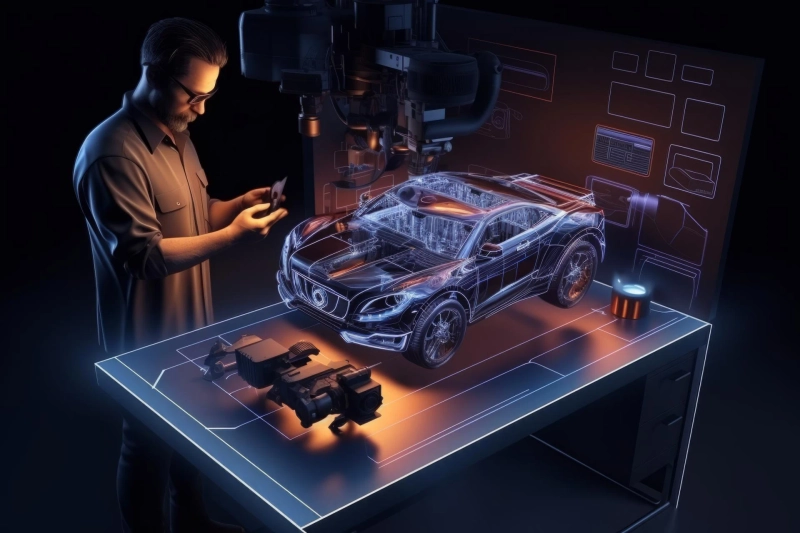With traditional manufacturing methods struggling to match the latest innovations and customization, the auto manufacturing sector is looking for means to stay ahead. Staying ahead in the automotive sector is not just about speed but it is about smart innovation. In an era when vehicles are emerging as computers on wheels, traditional manufacturing methods need to be replaced with smart automotive manufacturing that will allow automakers to stay agile, lean, and competitive. With the rise in demand for environment-friendly vehicles that are equipped with the latest digital features, automakers are revamping their production lines and operational workflows. The automotive manufacturers to address these challenges and thrive in this technological era are switching to smart automotive manufacturing solutions.
The Rise of Smart Manufacturing in Automotive
Smart manufacturing in automotive industry is a dynamic and digital solution transforming the way vehicles are designed, produced, and maintained. Automotive companies are using advanced solutions like digital twins, virtual commissioning, and the Industrial Internet of Things (IIoT) to transform their production lines into efficient, flexible, and sustainable systems. The automakers get a virtual representation of the manufacturing process with these tools that allow them meticulous plan and execute the production. The automotive companies of today are enhancing efficiency, reducing costs, and catering to evolving consumer demands by integrating data analytics, automation, AI, and the Internet of Things into their manufacturing operations.
The Growing Role of Smart Manufacturing
The global smart manufacturing market is experiencing significant growth and is expected to reach $600 billion by 2028, with the automotive industry being a major contributor. Smart manufacturing in the automotive industry is a game changer, especially with the precision, speed, and scalability of the vehicles are vital. There has been a rise in the adoption of advanced technologies by the automotive sector, as demand for electric vehicles, driverless cars, and sustainable vehicles are growing. Leading and prominent automotive companies are heavily relying upon smart manufacturing to remain competitive in the rapidly changing automotive sector. The switch to smart manufacturing indicates the industry’s shift to efficient, flexible, and sustainable production systems.
Key Technologies Driving Smart Manufacturing
Some of the key technologies that are driving smart manufacturing in the automotive industry include:
Artificial Intelligence and Machine Learning – Automotive companies are making use of Artificial Intelligence and Machine Learning to analyze vast datasets to optimize production schedules, predict maintenance needs, and improve quality control. AI-powered vision in the manufacturing system inspects components for defects with greater accuracy reducing errors and waste.
Internet of Things (IoT) – To ensure real-time data collection and analysis, automotive manufacturing companies make use of IoT to connect machines, sensors, and devices across the factory floor. Sensors are used in automotive plants to track inventory, monitor equipment performance, and optimize the supply chain. IoT-enabled assembly lines detect bottlenecks so that workflows can be instantly adjusted.
Robotics and Automation – The Automotive industry makes use of advanced robotic systems to carry out repetitive tasks like welding, painting, and assembly with exact precision. Collaborative robots are also employed along with humans to enhance productivity while maintaining safety.
Digital Twins – Automakers make use of digital twins, a virtual replica of an asset or process, to simulate production lines, test designs, and predict outcomes. Using technology auto manufacturers are able to detect flaws and inefficiencies before the start of the physical production which saves considerable time and resources.
Additive Manufacturing - 3D printing is used by automotive manufacturers for rapid prototyping and production of complex parts. Renowned automotive companies make use of additive manufacturing to create lightweight components for electronic vehicles to improve fuel efficiency and reduce material costs.
Benefits of Smart Manufacturing in Automotive
Leading automotive companies all over the world are greatly relying upon smart manufacturing solutions that benefit them in the following ways:
Increased Efficiency – Smart manufacturing technologies like AI, automation, and real-time data analysis streamline operations and reduce downtime. AI-powered predictive maintenance prevents equipment failures, thereby saving hefty repair costs.
Reduces Cost – Smart manufacturing in the automotive industry helps reduce waste and optimize resource use, thereby reducing production costs. Leading automotive company General Motors reduces 20% manufacturing costs after implementing IoT solutions.
Enhanced Quality – With an AI-driven quality monitoring system, automotive manufacturers meet stringent safety and performance requirements. Consumers' rising demand for reliability and sustainability is aptly met by the manufacturers in the smart manufacturing environment.
Flexibility and Customization - Smart manufacturing leads to flexible production lines that allow quick switch between vehicle models. This allows manufacturers to cater to the personalized vehicle demand.
End Note
Automotive industries are making innovative use of smart manufacturing technologies like IoT, AI, robotics, and digital twins for efficient, quicker, and sustainable production. The use of smart technologies allows automotive companies to cater to the demands of a rapidly evolving market while producing vehicles of improved quality and lower costs. With automotive companies embracing smart solutions, they are preparing a path for manufacturing vehicles in the future that is greener, smarter, and tailored exactly to the needs of the consumers.



